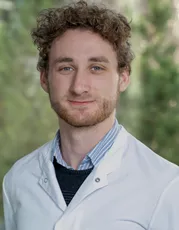Associated PhD students
Standardized metagenomic signatures in health and disease

Institut für Mikrobiologie und Hygiene
Universitätsklinikum Regensburg
Franz-Josef-Strauß-Allee 11, 93053 Regensburg
Supervisor:
Prof. Dr. Dr. André Gessner (Z02)
Description of Thesis
coming soon
Integrated analysis of microbiome multi-omics with disease and therapy metadata reveals determinants of microbiome recovery after allogeneic stem-cell transplantation

Klinik und Poliklinik für Innere Medizin III,
Hämatologie und Onkologie Klinikum Rechts der Isar der TU München
Supervisor
Dr. Erik Thiele-Orberg
Description of Thesis
A potentially curative treatment for patients suffering from hematological malignancies consists of cytotoxic therapy regimens followed by allogeneic hematopoietic stem cell transplantation (allo-HSCT). However, the broader applicability of this treatment is limited by several adverse affects which immensely increase morbidity and transplant-related mortality. Still the most common life-threatening complication is the gastrointestinal graft-versus-host-disease (GvHD) caused by donor T-cells attacking healthy recipient tissues. Recent research has highlighted strong correlations between intestinal bacterial microbiome alterations, their influence on GvHD pathophysiology and the clinical outcomes after transplantation. The intestinal microbiome in allo-HSCT recipients is altered by loss of bacterial diversity and single-taxon domination. Previous studies described a change in bacteria-derived metabolites during allo-HSCT and classified metabolite-producing bacterial consortia as either protective or deleterious according to their association with GvHD severity and mortality. Most studies have focused on microbiota compositions during transplantation period whereas clinical studies about the post-transplantation microbiome are still lacking. Thus, we aim to investigate the extent of microbiome recovery and its modulating factors and to identify potential metabolite-producing bacterial consortia in the post-transplantation microbiome, that may correlate with clinical outcomes. In order to establish a comprehensive longitudinal profiling of bacterial compositions and bacteria-derived metabolites in allo-HSCT patients, we perform translational analysis based on an ongoing prospective, observational clinical study. We longitudinally obtain human stool samples. We compare metabolite profiles (analyzed by mass spectrometry) and microbiome compositions (analyzed by 16S rRNA sequencing) of stool samples obtained after allo-HSCT with those profiles of samples obtained shortly before transplantation. Stool samples are referenced with extensive clinical metadata (occurrence of intestinal GvHD, survival data) and potential confounding factors (diet, antibiotic and immunosuppressive therapy).
Role of the gut microbiome in specific subgroups of colorectal cancer, and its correlation with intratumoral immune infiltration

Technical university of Munich
Klinikum rechts der Isar
Klinik und Poliklink für Chirurgie
Supervisor
Prof. Dr. Klaus-Peter Janssen
Description of Thesis
Colon cancer is one of the most common types of cancer worldwide, the number of new cases is rising. Despite improvement in prevention and treatment, half of the patients dies within 5 years after diagnosis. It has been shown that a high number of tumor infiltrating immune cells (eg CD8+ cytotoxic effector T-cells) favour the survival of the patients. For the recruitment, these T-cells need specific chemokines, which were shown to be expressed by tumour cells on exposure to gut bacteria. However, it is unclear which bacterial signatures and taxa are correlated with specific adaptive and innate immune infiltrates. Further, subgroups of colon cancer have been shown to have significantly worse prognosis, especially signet ring cell cancer, whereas the involvement of gut microbiota is unclear.Therefore, we want to investigate if there are specific bacterial taxa, or a specific composition of the gut microbiome, that leads to a higher TH1-type lymphocyte infiltration and therefore to a putative tumor suppression. Therefore, we are collecting stool and matched tissue samples from patients with colon cancer from different types (Adenocarcinoma, mucinous and signet ring cell carcinoma). The Immuno infiltrate is quantified on tissue by ChipCytometry (Zellkraftwerk). Microbome data are evaluated by 16S rRNA amplicon sequencing. As complementary in vitro model, organoids are established from tumors and normal mucosa from tumors of all subtypes. Statistical evaluation is done by correlating the results of the immuno-infiltrate with the output of the microbiome sequencing, including clinical relevant data of the patients. We aim to gather prognostic information about the course of disease, and, in the long term, to modify the tumor-influencing milieu, with the goal of a better clinical outcome and overall survival.
Association between colorectal polyps and various lifestyle and gut microbial factors

Technical University of Munich
Klinikum rechts der Isar
Klinik und Poliklinik für Innere Medizin II
Ismaninger Str. 22, 81675 München
Supervisor:
Prof. Dr. Quante (Freiburg)
Dr. med. Moritz Middelhoff (Z02)
Description
Colorectal cancer (CRC) ist the third most common cancer worldwide, with colorectal polyps serving as a main precursor. Several studies identified various lifestyle and epidemiological factors that may influence the risk of developing CRC. Moreover, evidence suggests that these factors contribute to the development of CRC through changes in gut microbiome. In this study we investigate different epidemiological, dietary, lifestyle, clinical, laboratory and microbial factors in patients with colorectal polyps. Defining risk and protector factors at the stage of precursor lesion could lead to important changes in prevention strategies.
Microbial signatures and gastrointestinal inflammation

Technical University of Munich
Klinikum rechts der Isar
Klinik und Poliklinik für Innere Medizin II
Ismaninger Str. 22, 81675 München
Supervisor:
Prof. Dr. Schmid
Dr. med. Moritz Middelhoff (Z02)
Description
Analysis of changes to microbial diversity and richness in adult patients suffering from IBD.
Correlation of epidemiologic and clinical metadata with microbial profiles from healthy and diseased patients to investigate the signatures of a healthy microbiome.

Technical University of Munich
Klinikum rechts der Isar
Klinik und Poliklinik für Innere Medizin II
Ismaninger Str. 22, 81675 München
Supervisor:
Prof. Dr. Schmid
Dr. med. Moritz Middelhoff (Z02)
Description of Thesis
Title

coming soon
Description
Atopic dermatitis (AD) is a chronic inflammatory skin disease typically characterized by skin barrier defects and microbial dysbiosis. Clinical trials and patient data demonstrated the causal role of type 2 cytokines in AD. Therapeutically targeting type 2 cytokines re-established barrier function and normalized cutaneous microbial composition in AD patients. However, it is not yet understood whether targeting barrier disruption or dysbiosis in AD is effective with regard to type 2 immune inflammation. To disclose the impact of barrier impairment and microbial dysbiosis on type 2 inflammation in AD, we set up a new model mimicking the initial phase of AD. To monitor the kinetics and to identify cellular contributors of type 2 immune responses, we use IL-4 and IL-13 reporter mice. On the long term, this project will contribute to the development of treatment strategies towards personalized AD therapy.
Systematic stool microbiome screening in allogeneic stem-cell transplantation patients reveals dynamic bacterial translocation preceding septicaemia

Technical Univrsity of Munich
Klinikum Rechts der Isar
Klinik und Poliklinik für Innere Medizin III
Hämatologie und Onkologie
Supervisor
Dr. Erik Thiele-Orberg
Description of Thesis
We are investigating the impact intestinal dysbiosis has on infection complications of patients during stem cell transplantation. Translocation of bacteria from the gut into the vascular system, if the mucous barrier is disrupted, is the center of my research. We want to evaluate if it is possible to detect the pathogen in the gut and other mucous membranes before a blood stream infection occurs
Characterization of innate-like and tissue repair-associated features in commensal-reactive T cells in the intestine

ZIEL - Institute for Food & Health, Weihenstephaner Berg 3, 85354 Freising
Supervisor
Dr. rer. nat. Carl-Philipp Hackstein
Description
The human body is home to myriad microbes which are known to play crucial roles in health and disease. In my PhD project, I specifically aim to understand how interaction with microbe’s shape phenotypes and functions of T cells in the gut. This project is based on a recent publication describing the expression of innate-like and tissue-repair associated features in commensal-reactive T cells (Hackstein et al., 2022, doi:10.1038/s41467-022-35126-3). These properties allow the cells to participate in immune-surveillance and endow them with the capacity for tissue repair.In order to answer these questions, I am planning to isolate and characterize anti-microbial T cells using different in vitro and in vivo assays and a variety of methods including TCR-transgenic mouse models, flow cytometry and single-cell RNA-sequencing. A particular focus will be on the identification and validation of markers of anti-microbial T cells in both humans and mice as well as their functional profiling that are relevant for barrier maintenance and protective immunity.
Regulation of intestinal tolerance and allergic predisposition by the intestinal microbiota

Helmholtz Zentrum München and Technical University of Munich
Institut of Allergy Research (IAF)/ The Center of Allergy and Environment (ZAUM)
Supervisor
PD Dr. Caspar Ohnmacht (P07)
Description
Allergic diseases are highly prevalent in industrial countries. This risen prevalence has been attributed to a change in lifestyle factors that also affects intestinal microbiota composition. Such a microbial dysbiosis - particularly early in life - has been associated with atopic diseases later in life. In murine models, we amongst others have shown that mice housed under germ-free conditions show an impaired immune system in the gut. In particular, these mice have drastically reduced frequencies of peripherally-induced regulatory T Cells in the intestine. Re-colonization of germ-free mice re-establishes such inducible Treg populations, which are defined by the co-expression of the transcription factors Foxp3 and ROR(γt). We hypothesize therefore that these cells are key regulators in intestinal immune tolerance. The microbial factors driving this Treg induction remain still poorly understood.
In this project we will make use of a set of mice with reduced microbial complexities: ASF (Altered Schaedler flora, eight strains), Oligo-MM (Oligo-Mouse Microbiota, twelve strains) and SPF (specific pathogen free, complex microbiota) in collaboration with members of this consortium (AG Bleich and AG Stecher-Letsch). In order to identify causative host-microbiome relationships these gnotobiotic mouse models are used to identify microbial-derived parameters (using metatranscriptomics/metagenomics and metabolomics approaches) that enforce or break intestinal immune tolerance. Murine food allergy models to known allergens including a model of red meat allergy (in cooperation with the AG Biedermann) will be used to determine how differential microbial compositions affect disease outcomes.
Virome function characterization in Helicobacter pylori-induced colorectal carcinogenesis

Helmholtz Zentrum München
Institute of Virology
Emmy Noether Junior Group Leader “Virus in Nature and Health”
Ingolstädter Landstr. 1, 85764 Neuherberg
Supervisor
Ph.D. Li Deng (P09)
Description of Thesis
Highly diverse viral communities inhabit the human body, including eukaryotic viruses and bacteriophages. Phages residing in the human gut outnumber tenfold gut bacteria. The numerical dominance enables gut phages to encounter and interact with the host bacteria. They can shape bacteriome by directly lytic infecting host bacteria, alternatively, by integrating into bacterial chromosomes to supply them with virulence associated-auxiliary metabolic genes (AMGs). Specific environmental stimuli can induce the phages with latter capacity turning into lytic cycle and transferring these genes to adjacent susceptible hosts, eventually increasing the pathogenicity of the opportunistic pathogens to trigger the diseases. Hence, further understanding of the alterations of the gut phage community, and their interactions with host bacteria, could help to elucidate the molecular mechanisms underlying disease pathogenesis.
Helicobacter pylori is the main risk factor for gastric cancer development and also elicits systemic consequences on extragastric diseases, especially colorectal cancer (CRC), which is the second most commonly diagnosed cancer. We established cooperation with AG Gerhard, whose study suggests a possible link between H. pylori infection and intestinal/colonic pathologies through alterations in the gut microbiota and host immunity. However, the study directly describing the role of gut virome in H. pylori derived-CRC is still missing.
In this project, we postulate that the gut viral community is associated with H. pylori derived-CRC tumorigenesis via its interaction with the bacterial community. In addition, given that H. pylori is typically treated with a combination of antibiotics plus a proton pump inhibitor, we would further study the impacts on virome bought by H. pylori eradication treatment.
Target Discovery of Gut Metabolites from Intestinal Microbiota by Chemical Proteomics

TUM School of Natural Sciences, Chair of Organic Chemistry II. Garching, TUM
Supervisor
Prof. Dr. Stefan Sieber (P16)
Description
Proteomics based on mass spectrometry is a powerful tool for analysing proteome-wide changes within cells in response to external stimuli. We apply this technique to discover protein targets of gut metabolites with unknown function produced by the gut microbiota. Our chemical proteomics approach consists of two complementary techniques: (1) Activity-Based Protein Profiling (ABPP), which uses chemically modified probes, and (2) Thermal Proteome Profiling (TPP), which does not require modification of compounds. Taken together, the discovery of gut metabolite targets will help improve our understanding of the interactions between the gut microbiota and its host and shed light on the role of those metabolites in disease pathways.
PiggyBac transposon-based genetic screening in mice to uncover molecular networks of BrafV600E-induced intestinal tumourigenesis

Technical University of Munich
Klinikum rechts der Isar
Department of Surgery
Supervisor
Ph.D. Markus Tschurtschenthaler (P11)
Description
BRAF-mutant colorectal cancers form a large tumour subset with distinctive morphologic, genetic and clinical characteristic. The molecular evolution of these cancers is however poorly understood. In order to identify genes and pathways that cooperate with Braf in the setting and progression of CRC we developed a PiggyBac transposon-based cancer gene discover tool-kit in mice, which enables unbiased genetic screening in vivo. Using this approach relevant pathways or pathway branches are “hit” by transposons at multiple levels and the transposon integration pattern predicts the gene’s function as oncogenic or tumour suppressive. For the validation of these “hits” we developed an orthotopic transplantation model based on colonoscopy-guided injections of intestinal organoids into the submucosa of the rectum/distal colon. This technology allows the control of tumour development in an efficient spatio-temporal manner without the need for extensive intercrossing of mice. Intestinal organoids derived from the normal and tumour mouse tissue recapitulate key morphological and histological features of the organ architecture of the mouse. Additionally we are currently using CRISPR/Cas9 genetic editing tool in order to inactivate tumour suppressor genes in WT or Braf-mutant organoids. Upon injection of the edited organoids into recipient mice, tumour formation will be assessed and the tumours characterized. Furthermore, the combination of these technologies enables the characterization of the microbiota signatures both at the site of primary tumour (colon) and at metastatic sites (liver and lung) as tumours injected with organois have the ability to progress to advanced stages of disease.
Microbial signatures and gastrointestinal inflammation

Technical University of Munich
Klinikum rechts der Isar
Klinik und Poliklinik für Innere Medizin II
Ismaninger Str. 22, 81675 München
Supervisor:
Dr. med. Moritz Middelhoff (Z02)
Description
Project description: Analysis of changes to microbial diversity and richness in adult patients suffering from IBD.
The Intestinal Microbiome and its Metabolites in Onset, Progression and Relapse of Multiple Myeloma

Technical University of Munich
Klinikum rechts der Isar
Klinik und Poliklinik für Innere Medizin II
Ismaninger Str. 22, 81675 München
Supervisor:
Dr. med. Univ. Erik Thiele-Orberg
Description of Thesis
The entirety of all genomes of microbes in an ecosystem is defined as microbiome and the human body is colonized by microbes with at least as many cells as number of human cells. The individual composition of the intestinal microbiome is influenced by many different factors such as diet, medication, the hosts genes, infections and many others. The microbiome itself has an immense impact on the human metabolism, immune maturation, the regulation of intestine endocrine functions and the progression of certain diseases. These include obesity, colon cancer or chronic inflammatory bowel disease and autoimmune diseases.
Recent findings also suggest a connection between certain microbial compositions and the carcinogenesis of different malignancies. Ways in which microbes and according metabolites effect malignancies include DNA damage or an alteration of gene expression through certain metabolites.
In our working group we are focusing on hematological malignancies and their correlation with the intestinal microbiome. Our latest project takes a closer look at patients with Multiple Myeloma (MM) and the pre-stage “monoclonal gammopathy of unclear significance” (MGUS). MM belongs to the B-cell Non-Hodgkin-Lymphomas, is a hematological plasma cell malignancy, and is characterized by an increased proliferation of plasma cells infiltrating the bone marrow. Previous mouse studies suggest a cytokine mediated migration of different immune cell populations and metabolites from the gut into the bone marrow. We investigate the influence certain bacterial compositions and according metabolites may have on the progression of MM and the efficacy of myeloma specific therapies.
Therefore, I analyze bone marrow samples of myeloma patients using intracellular cytokine staining and flow cytometry. With statistical analyses we will correlate these findings with 16s-rRNA microbiome data including information about composition, diversity and metabolites of the intestinal microbiome.